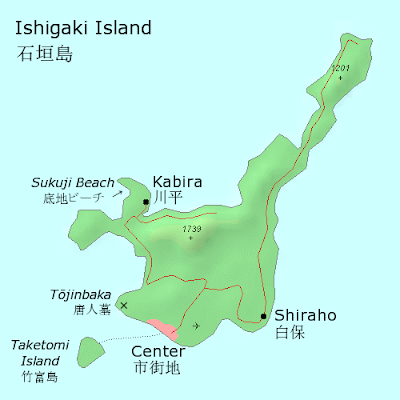目次
/
Contents
1) 県花
/
Prefecture Flower
2) 島唄 /
SHIMAUTA
 |
| 赤い部分 : 沖縄県 / Red Part : Okinawa Prefecture 画像は下記より / This from below ★ |

島の北西には、エメラルドブルーの川平湾があります。
At the northwest corner of the island is an emerald blue bay : Kabira Bay.
|
1) 県花 / Prefecture Flower
 デイゴ : 梯梧の花 Flowers of Erythrina Variegata : Deigo in Japanese |
川平湾 (カビラワン) の駐車場近くで、デイゴの花を初めて見ました。
デイゴが見事に咲くと、その年は台風の当たり年であるという言い伝えがあります。
言葉を変えると、その年は天災に多く見舞われると言うことです。
このことは、"島唄"
(2) に記述)
にも下記 (出だし2行) のように歌われています。
"でいごの花が咲き 風を呼び 嵐が来た
でいごが咲き乱れ 風を呼び 嵐が来た"
 デイゴ : 梯梧の花 Flowers of Erythrina Variegata : Deigo in Japanese
Erythrina Variegata (Deigo in Japanese) is a bean family, deciduous tall tree
and originally came from India and the Malay Peninsula.
It is native to the tropical and subtropical regions of eastern Africa,
and it is said that Okinawa Prefecture is regarded as the northern limit in Japan.
|
Prefecture Flower
Deigo is a prefectural flower in Okinawa Prefecture, red flowers bloom from spring to early summer.
There is a legend that when Deigo blooms spectacularly, the year has bumper typhoons.
In other words it means that many natural disasters hit in that year.
"Deigo's flowers were blooming, Wind and Storm came here
Deigo's flowers bloomed in profusion, Wind and Storm came here"
(The first 2 lines of the song. Translation by me.)
2) 島唄 / SHIMAUTA
ロックバンド、"THE
BOOM" (1986年結成
-
2014年解散) の曲 "島唄" で、デイゴの花は知名度があげたように思います。
バンドボーカルの宮沢和史 (1966 -) 氏は、 "島唄" の作詞作曲もしています。
彼は、ひめゆり学徒隊で生き残った老婆の話をきいて、 "島唄" を作りました。
"島唄" は反戦の歌なのです。
(全歌詞はここで→★ / 真の意味はここで→★ ; 裏歌詞付き歌はここで→★)
ですが、宮沢和史氏は、聴く人の解釈で良いという姿勢です。
バンドボーカルの宮沢和史 (1966 -) 氏は、 "島唄" の作詞作曲もしています。
彼は、ひめゆり学徒隊で生き残った老婆の話をきいて、 "島唄" を作りました。
"島唄" は反戦の歌なのです。
(全歌詞はここで→★ / 真の意味はここで→★ ; 裏歌詞付き歌はここで→★)
ですが、宮沢和史氏は、聴く人の解釈で良いという姿勢です。
"島唄" は、1992年に沖縄方言 (ウチナーグチ) で歌われた "島唄" (ウチナーグチ・ヴァージョン)" が沖縄限定発売が最初にあり、1993年、標準語で歌われた「オリジナル・ヴァージョン」が全国で発売され、150万枚以上を売り上げる大ヒットになりました。
2002年には、アルゼンチンでアルフレッド・カセーロ (1962 -) が日本語のままカバーした"SHIMAUTA" (★)が発売、現地で大ヒットし、サッカーの2002年日韓ワールドカップ・アルゼンチン代表チームの応援曲に起用されました。
アルゼンチンの人々は、 "島唄"が反戦の歌であることを知ったうえで、応援曲に選んだのでしょうか?
ちなみに宮沢和史氏は、沖縄出身ではなく、山梨県出身です。
アルゼンチンの人々は、 "島唄"が反戦の歌であることを知ったうえで、応援曲に選んだのでしょうか?
ちなみに宮沢和史氏は、沖縄出身ではなく、山梨県出身です。

The BOOM の8cmCDシングル "島唄"の表紙
|
SHIMAUTA
Because of the song "Shima Uta" by a Japanese rock band "The Boom" (formed in 1986 - dissolved in 2014), I think that Deigo's flower became well known.
("Shima Uta" with English subtitle → ★)
Kazufumi Miyazawa (1966 -) was the band vocalist and also wrote the words and music of "Shima Uta".
He listened to the story of an old woman who survived the "Himeyuri Students" : "Lily Corps" and made "Shima Uta".
"Shima Uta" is an anti-war song.
(Japanese and English Lyrics here →★)
However, Kazufumi Miyazawa said that the understanding of the song depends on listener.
("Shima Uta" with English subtitle → ★)
Kazufumi Miyazawa (1966 -) was the band vocalist and also wrote the words and music of "Shima Uta".
He listened to the story of an old woman who survived the "Himeyuri Students" : "Lily Corps" and made "Shima Uta".
"Shima Uta" is an anti-war song.
(Japanese and English Lyrics here →★)
However, Kazufumi Miyazawa said that the understanding of the song depends on listener.
"Shima Uta (Uchinaguchi Version)" was sung in Okinawa dialect (Uchinaguchi) , and only released and sold in Okinawa, in 1992.
In 1993, they sang the song in standard Japanese, though they called it the "Original version", released across Japan, which then became a big hit selling over 1.5 million.
In 1993, they sang the song in standard Japanese, though they called it the "Original version", released across Japan, which then became a big hit selling over 1.5 million.
In 2002, "SHIMAUTA" (★) which Alfred Casselo (1962 -) covered in Japanese was released in Argentina, a big hit in the country, and was adopted as the cheering song for the Argentina National Team of football in the 2002 FIFA World Cup.
Did Argentines select "SHIMAUTA" as their cheering song after knowing that the Song is an anti-war song?
By the way Kazufumi Miyazawa did not come from Okinawa Prefecture, he came from Yamanashi Prefecture.
Did Argentines select "SHIMAUTA" as their cheering song after knowing that the Song is an anti-war song?
By the way Kazufumi Miyazawa did not come from Okinawa Prefecture, he came from Yamanashi Prefecture.


0 件のコメント:
コメントを投稿